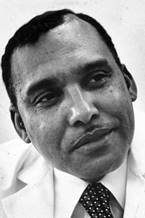SUNY Downstate Celebrates Black History Month
By Office of Communications & Marketing | Feb 7, 2022
February marks an important time every year as we celebrate Black History Month. It is a time to reflect on the contributions of African Americans to the nation.

Dr. Samuel Kountz
Fifty years ago, Dr. Samuel Kountz, a pioneer in kidney transplantation, joined SUNY Downstate as professor of surgery
and chairman of the Surgery Department. He was the nation’s first African-American kidney transplant surgeon. In 1972, he
established Downstate’s kidney transplant program that remains the only kidney transplantation
center in Brooklyn.
Since then, SUNY Downstate has performed more than 3,000 kidney transplantation surgeries providing new opportunities for normalcy in the lives of patients with end-stage renal disease.
We are reminded of African Americans’ strength, hope, resiliency, and hard work while observing Black History Month. It is essential to recognize those individuals who have given so much of themselves and are part of the historical fabric of this country and the world. In addition, Black History Month is an opportunity to honor pioneers who inspire generations of future leaders.
In the world of medicine, much remains to be learned about some of the pioneers who have led the way. Born into slaveholders in 1762, James Durham is considered the first African American to work as a doctor in America. While he never formally held a medical degree, some of his “owners” were physicians who taught him what they knew. He would eventually run a successful practice in New Orleans, where he helped victims of yellow fever.
Downstate is a great institution of different races, religions, ethnicities, genders, sexual orientations, and sexual identities–and your participation in its life makes us that much more robust and better.
Our profile for Black History Month is Camille Clare, M.D. MPH. In addition to her role as Chairperson of the OB-GYN Department here at Downstate, she is also Associate Professor of Obstetrics and Gynecology and the Associate Dean of Diversity and Inclusion at the New York Medical College School of Medicine.
Aligning diversity with community growth is the next step in challenging ourselves to consistently seek out and search for stories and experiences that expand our understanding of African American history to include all who play a role in it.
I am proud to lead SUNY Downstate. Its rich history of diversity among faculty, students, staff, and the communities we are pleased to serve in our global society.
###
Contact: Dawn S. Walker
917.439.9666 | 347.533.2071
dawn.walker@downstate.edu
About SUNY Downstate Health Sciences University
SUNY Downstate Health Sciences University is the borough's only academic medical center for health education, research, and patient care. It is a 342-bed facility serving the healthcare needs of New York City and Brooklyn's 2.6 million residents. University Hospital of Brooklyn (UHB) is Downstate's teaching hospital, backed by an outstanding medical school's expertise and world-class academic center research facilities. More than 800 physicians, representing 53 specialties and subspecialties—many of them ranked as tops in their fields—comprise Downstate's staff.
In addition to high-risk neonatal and infant services, pediatric nephrology, and dialysis (kidney diseases)—and offering the only kidney transplantation program in Brooklyn, among many other distinctive programs—Downstate also sponsors a major learning center for young children with developmental disorders and disabilities. In addition to UHB, Downstate comprises a College of Medicine, College of Nursing, School of Health Professions, a School of Graduate Studies, a School of Public Health, and a multifaceted biotechnology initiative, including the Downstate Biotechnology Incubator and BioBAT for early-stage and more mature companies, respectively. For more information, visit www.downstate.edu or follow us on Twitter at @sunydownstate.